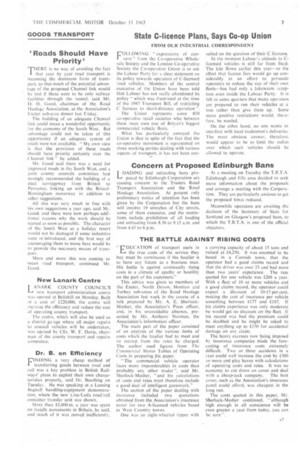State C-licence Plans, Says Co-op Union
Page 9

If you've noticed an error in this article please click here to report it so we can fix it.
FROM OUR INDUSTRIAL CORRESPONDENT
FOLLOWING "expressions of concern " from the Co-operative Wholesale Society and the London Co-operative Society the Co-operative Union is to ask the .Labour Party for a clear statement on its policy towards operators of:C-licensed road vehicles, Members of the central executive of the Union have been told that Labour has not really abandoned its policy " which was frustrated at the time of the 1947 Transport Bill, of restricting C licences to short-distance operation ".
The Union represents some 850 co-operative retail societies who between them must own one of Britain's biggest commercial vehicle fleets, 4
What has particularly annoyed the Union is that in spite of the fact that the co-operative movement is represented on three working parties dealing with various aspects of transport, it has not been con suited on the question of their C licences.
At the moment Labour's attitude to C. licensed vehicles is still far from fixed. The kite flown earlier this year—to the effect that licence fees would go up considerably in an effort to persuade operators to reduce the size of their own fleets—has had only a lukewarm reception even inside the Labour Party. It is felt in some quarters that many operators arc prepared to run their vehicles at a loss rather than give them up. Some more positive restrictions would, therefore, be needed.
On the other hand, no one wants to interfere with local tradesmen's deliveries. The most obvious answer, therefore, would appear to he to limit the radius over which such vehicles should be allowed to operate.




















































































































